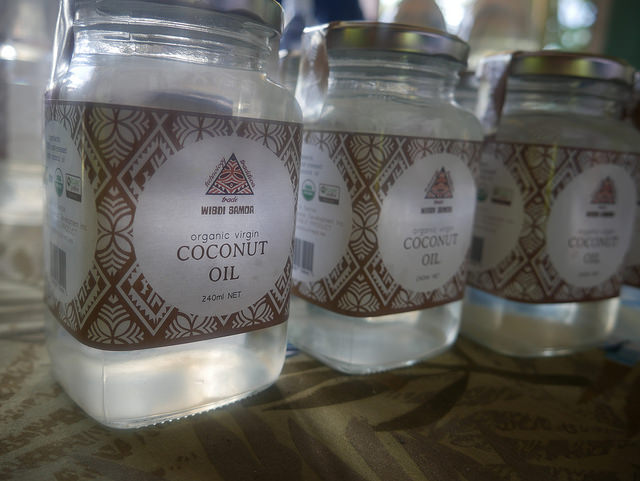Everything You Knew About Coconut Oil is Wrong

By:
Recently, coconut oil has seen a surge in popularity, emerging as a new staple for the health-conscious set.
A search for #coconutoil on Instagram shows well over one million results; with #coconutoilbenefits coming in at over 17,000. And it's become a signature ingredient for many who follow the paleo diet. As PaleoLeap, a website that offers tips to adhere to the carb-eschewing eating plan, noted, "coconut oil is a popular Paleo cupboard staple, and for good reason: it’s incredibly versatile," It also refers to the oil as a "high-quality fat."
"The Coconut Oil Miracle" by Bruce Fife also sings its praises, and claims that, "when taken as a dietary supplement, used in cooking, or applied directly to the skin, coconut oil has been found to: promote weight loss, help prevent heart disease, cancer, diabetes, arthritis, alzheimer's, and many other degenerative diseases, strengthen the immune system, [and] improve digestion," among other benefits.
Sounds pretty great, right?
But the American Heart Association isn't on board.
Earlier this month, a report from the American Heart Association (AHA) offered a study on preventive treatment against cardiovascular disease (CVD) that declared, "lower intake of saturated fat coupled with higher intake of polyunsaturated and monounsaturated fat is associated with lower rates of CVD and of other major causes of death and all-cause mortality."
Wait, what does this have to do with coconut oil?
 CTA ACP-EU/Flickr - flic.kr
CTA ACP-EU/Flickr - flic.kr
Well, coconut oil is a saturated fat.
As USA Today reported (emphasis ours), "researchers didn't see a difference between coconut oil and other oils high in saturated fat, like butter, beef fat and palm oil. In fact, 82% of the fat in coconut oil is saturated, according to the data — far beyond butter (63%), beef fat (50%) and pork lard (39%)."
They continue:
"'Because coconut oil increases LDL ['bad'] cholesterol, a cause of CVD [cardiovascular disease], and has no known offsetting favorable effects, we advise against the use of coconut oil,' the American Heart Association said in the Dietary Fats and Cardiovascular Disease advisory.'"
It's never been a secret that coconut oil is high in saturated fat — but the current hype around coconut oil has the AHA is taking a stand now.
As USA Today reported, Frank Sacks, who was the lead author on the report, said "he has no idea why people think coconut oil is healthy," adding, "It's almost 100% fat." One reason for the confusion? Past weight loss studies which suggested that the use of coconut oil could be linked to shedding pounds.
But as The Mayo Clinic reported, "the few small studies that have looked at coconut oil for weight loss suggest that coconut oil may help reduce waist size, but it doesn't lead to significant weight loss or improved body mass index (BMI)," adding, "However, coconut oil is still high in calories and saturated fat. Coconut oil has more saturated fat than lard does."
It's not that coconut oil is "bad," per se. It's just not a magic tool to health and weight loss.
Sacks even advises, per USA Today, "you can put it on your body, but don’t put it in your body," recognizing that the oil does have moisturizing properties. But there's no grounds to celebrate it as a particularly healthy choice when it comes to cooking.
So basically, the rule for using coconut oil boils down to that familiar weight loss advice: Everything in moderation.
[H/T USA Today]
